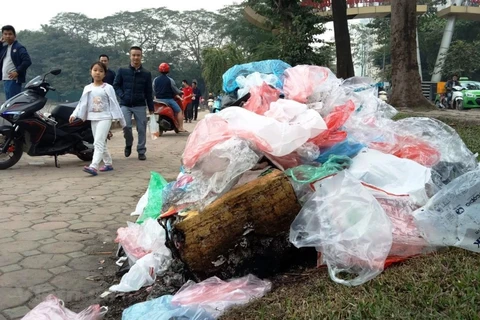
A landfill full of plastic bags in Ba Ria-Vung Tau province. The EPR scheme aims to push plastic producers to redesign their products for environment. (Photo: VNA)
This was the concern among Vietnamese plastic companies over the EPR scheme that will take effect on January 1, 2024.
A representative from the Vietnam Plastic Association (VPA) said the EPR scheme, which was first introduced in the Law on Environmental Protection in 2020, would make plastic producers and importers responsible for the recycling of their packaging from early 2024.
They are allowed to undertake the responsibility by either choosing a form of recycling defined in Decree No. 08 or paying EPR fees to the Vietnam Environmental Protection Fund. Four forms of recycling are available: self-implementing, engaging a recycling unit, authorising an intermediary, or combining these three forms.
Producers and importers who opt for EPR fees would be neither required to implement a recycling plan nor report on the results of recycling. The fees would come into force on January 1, 2024 for packaging, 2025 for electronics, and 2027 for vehicles.
VPA Secretary-General Huynh Thi My said the plastic industry can be divided into four main sub-industries, namely packaging, household-use plastics, building plastics, and engineering plastics. Packaging would be the only sub-industry to be made subject to EPR fees owing to its substantial impacts on the environment.
Under Decree No. 08, EPR fees are determined by multiplying volume of plastic waste (V), compulsory recycling rate (R), and reasonable recycling cost for a unit volume of packaging (Fs). Although the Fs has yet to be promulgated, plastic companies are concerned that the cost would weigh heavily on their financial position.
"Fs must be set as low as possible, or else producers would have no choice but to pass EPR fees on to their product prices, putting consumers at the receiving end of the policy," said My.
A company producing 100 tonnes of PP packaging per month could be taken as an example to demonstrate Fs's implications. As the compulsory recycling rate applicable to PP packaging is set at 15%, the company would be required to recycle at least 15 tonnes of PP plastics monthly under Decree No.08.
Suppose the Fs proposed by the Ministry of Natural Resources and Environment is used to calculate EPR fees, the fee incurred by a company would stand at 4 billion VND annually, a substantial outgoing for its revenue of 200 billion VND.
Experts called for a step-by-step approach to the promulgation of Fs to make plastic companies well-prepared for the upcoming EPR scheme. The first step, they believed, should involve setting a norm for the treatment of plastic waste; the next, building more facilities for plastic collection and recycling./.
VNA























